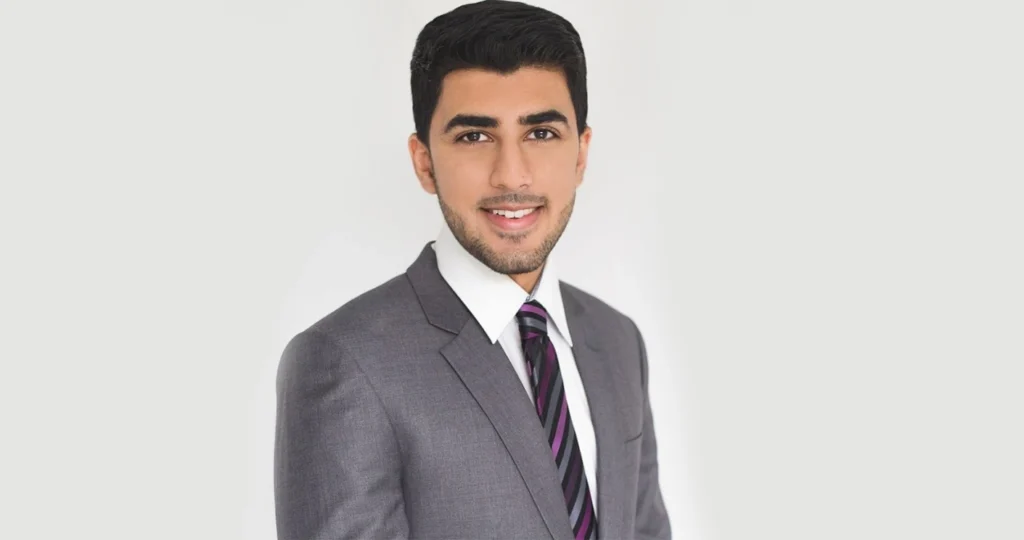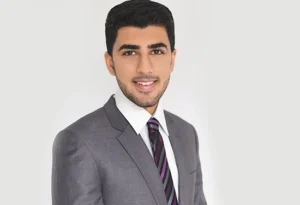
The JDRF Canada Clinician Investigator Fellowship is open to medical residents that are pursuing an additional research degree (Master, PhD, or postdoctoral training) in the field of type 1 diabetes research. Residents must be part of their university’s Clinician Investigator Program (CIP) which is guided by The Royal College of Physicians and Surgeons of Canada. The major goal of the CIP is to assist in the career development of clinician investigators in Canada. At the end of the research component of the program, the resident will be expected to have acquired the knowledge, skills, and attitudes fundamental to embarking on a career in health research.
Dr. Ahsen Chaudhry is the first recipient of the JDRF Canada Clinician Investigator Fellowship. He completed his medical degree at the University of British Columbia in 2019 and became a Fellow of the Royal College of Physicians of Canada as a certified physician in 2023. Ahsen will now be pursuing a research-based master’s degree via the UBC Clinician Investigator Program.
Dr. Timothy Kieffer, who will supervise Dr. Chaudhry’s research, emphasized the importance of this fellowship: “Ahsen has demonstrated a passion for the role of a clinician-scientist and has a strong aptitude for integrating research into his clinical practice. This program will provide Ahsen with the skills necessary to facilitate the further development of his academic endocrinology career, with a special focus on cell therapy for diabetes. It is important that we build additional capacity and encourage promising fellows like Ahsen to pursue this area of research, to maintain our world leadership in [the type 1 diabetes cell therapy] field.”
JDRF had the pleasure of connecting with Dr. Chaudhry to congratulate him on his new fellowship and discuss his research.
Tell us a bit about your background:
“I grew up in Prince George, BC, where I completed my undergraduate degree in Biochemistry and Molecular Biology at the University of Northern British Columbia. I moved to Vancouver to attend medical school at UBC, where I then completed my residency in Internal Medicine and sub-specialty training in Endocrinology.”
What drew you to medicine in general and to diabetes?
“Medicine is a gratifying field that combines the rigour of science, the art of patient care, and the spirit of compassion. The ability to make a tangible difference in someone’s life by combining these aspects is what motivated me to pursue medicine. My interest in diabetes developed early from exposures in my undergraduate studies and medical school, where I was fortunate to join research on diabetes and pancreatic beta-cell physiology. I was humbled by the fascinating cellular processes and web of interacting systems that underpin this disorder, and how much we still have to learn. As I progressed further through my medical training, I witnessed the heavy burden and human cost that diabetes has. It is a chronic condition with a number of serious complications and impacts on quality of life, and it is sincerely a privilege to work with patients on a long-term basis to help them manage their diabetes and maintain their health.”
Why do you want to do research in this area?
“Although the field has come very far since the momentous discovery of insulin, there is still much work to be done to improve diabetes care and help relieve the many challenges faced by people living with diabetes. Thankfully, we are at the cusp of an exciting revolution, particularly for Type 1 Diabetes (T1D), with the advent of stem-cell therapy that has the potential to make beta-cell and islet replacements a functional cure for T1D. By pursuing both clinical and basic science training in diabetes and islet/stem cell transplant, I hope to help contribute to this exciting area by helping the discoveries made at the bench progress through clinical trials and then eventually to clinical practice.”
What will you investigate during your Clinician Investigator Fellowship?
“My main project will focus on investigating the use of miRNA-based biomarkers for characterizing graft cell death in patients who have undergone stem cell derived pancreatic progenitor implants as well as cadaveric islet cell transplants, under the mentorship of Dr. Timothy Kieffer. The aim is to develop a non-invasive method for tracking the viability and natural history of these cells, which could help impact future clinical trials and patient management by giving insight into where protocol changes and optimizations need to be made. I will also be assisting with and recruiting for clinical trials of patients receiving novel stem cell-based beta-cell replacement therapies. Additionally, I will be receiving clinical training in islet transplantation and transplant endocrinology during my fellowship.”
How will the JDRF Fellowship support your research?
“The fellowship provides crucial funding that will support me in my clinical and research training, assisting me to become an independent clinician-scientist focused on translational research in diabetes and transplantation. Moreover, by enabling the opportunity to work at the JDRF Center of Excellence in UBC, I am privileged to be able to collaborate and network with leading experts, as Vancouver is home to amazing scientists who are world-leaders in several aspects of T1D research. This is so meaningful in helping my research benefit from and contribute to the broader diabetes research community. We are also rapidly expanding clinical activity and infrastructure in islet transplantation and clinical trials in Vancouver that are informed heavily by a lot of research that has been done here. JDRF’s support is instrumental to cementing this growing collaboration between researchers and clinicians in Vancouver that can help it become a key center for islet transplantation, cell therapy, and innovation in T1D. Ultimately, we hope this will translate to the most important goal of all, improving the lives and outcomes of our patients.”
JDRF Canada thanks Dr. Chaudhry for his time and congratulates him on the fellowship award. We wish him the best of luck with his research work, and we will share research updates when they become available.




